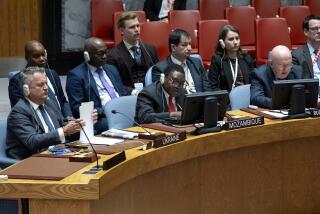S. Korean Poised to Succeed Annan
UNITED NATIONS — South Korean Foreign Minister Ban Ki-moon is one step away from being named the U.N.’s next secretary-general, after winning the support of all five permanent Security Council members in an informal poll Monday.
Ban, 62, won the support of 14 of the Security Council’s 15 members in a closed-door poll, with one nonpermanent member expressing “no opinion.” The balloting was secret, but permanent members marked blue ballots to distinguish their votes. A rejection by a veto-holding nation -- Britain, China, France, Russia or the United States -- can be enough to end a candidacy.
“To the U.S. government, he is well known and highly respected,” U.S. Ambassador John R. Bolton said after the Ban poll. “He has had extensive experience in bilateral and multilateral diplomacy and as foreign minister and an ally of the U.S.”
The council will hold a formal ballot next Monday, and then the General Assembly must vote.
Secretary-General Kofi Annan, from Ghana, steps down Dec. 31 after two five-year terms. Annan has called the post “the world’s most difficult job” and joked that “S.G.” stands not just for secretary-general, but also for “scapegoat.”
Ban would inherit a sprawling bureaucracy of 9,000 workers and a $5-billion budget, with aid agencies and 18 peacekeeping operations spanning the globe.
He said in an interview last week that he wanted “to make the U.N. relevant again,” aware that its image had been damaged by scandals and management failures. He argued that the Security Council’s role at the center of peace talks in the Middle East and negotiations in Iran, North Korea and Sudan demonstrated the U.N.’s crucial role in world affairs.
Ban, a career diplomat, has been posted to India, Washington and Austria. In 2001, he served as chief of staff to the U.N. General Assembly president. As South Korea’s foreign minister, he has been involved in six-nation talks about North Korea’s nuclear program, an issue he says he would like to be personally involved in if he becomes secretary-general.
A low-key, steady civil servant, he is a self-described “consensus-builder” and is aware that some people say he lacks charisma. But he believes that working quietly behind the scenes is the best way to craft an agreement.
Chinese Ambassador Wang Guangya agrees.
“I think that he is an experienced one -- he is low-key but very firm. He is decisive,” Wang said Monday.
Ban, who has been careful not to alienate Security Council members, has taken up the call for reform of the United Nations, a popular stance.
“The organization suffers from a chronic weakness: its inability to set priorities and make choices,” he said last week at a forum in New York. “The U.N. needs to promise less and deliver more.”
The selection of the secretary-general has been criticized as secretive and unfair, with the Security Council’s five permanent members largely responsible for selecting the world’s top diplomat. The ideal candidate, said Brian Urquhart, a former undersecretary-general, is someone strong enough to clean up the organization but not challenge the permanent members.
This year’s process was more public than usual, with candidates scattering across the globe in informal campaigning. But it also invited more scrutiny than most candidates are comfortable with. Ban, with clear discomfort, had to justify generous aid grants he dispensed to a few Security Council member countries that he visited as Seoul’s minister of foreign affairs and trade.
Ban was the only candidate who did not receive any “discouragements,” the equivalent of a veto in the informal poll.
Undersecretary-General Shashi Tharoor, 50, of India finished second and withdrew from the race.
“It is clear he will be the next secretary-general,” Tharoor said in his concession speech, referring to Ban.
The rest of the candidates received support from less than half of the Security Council. They were Latvian President Vaira Vike-Freiberga; Thai Deputy Prime Minister Surakiart Sathirathai; Prince Zeid Raad Hussein, Jordan’s ambassador to the U.N.; and Afghanistan’s former Finance Minister Ashraf Ghani.
Jayantha Dhanapala, a U.N. expert on nonproliferation from Sri Lanka, withdrew from the race Friday.
*
More to Read
Sign up for Essential California
The most important California stories and recommendations in your inbox every morning.
You may occasionally receive promotional content from the Los Angeles Times.










